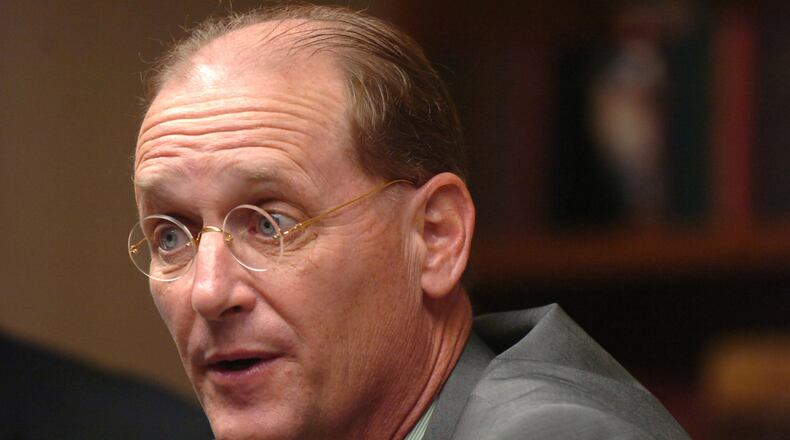Update at 1 p.m. Thursday: I just ran into state Rep. Earl Ehrhart, R-Powder Springs, the featured player in the effort to deprive Delta and other airlines of a 10-year tax break -- as laid out below. Ehrhart told me he had a "cordial and polite" conversation this morning with Delta CEO Richard Anderson, something he'd been seeking for several weeks.
Original post: There has always been a symbolic price to be paid for active corporate citizenship in Georgia.
But on Thursday, members of the House are likely to put a solid dollar figure to it.
Contained in the $1 billion transportation bill set to be voted on in that chamber today is a new provision that would end a 10-year-old tax break on aviation fuel – worth about $23 million a year, by today's oil prices.
Delta Air Lines would suffer the lion’s share of that hit.
State Rep. Earl Ehrhart of Powder Springs, the Republican behind the push, insists that conservative policy is his only motivation. "A tax exemption should not be permanent. And right now, Delta can't make a case to have an exemption," Ehrhart said, pointing to the airline's $2.8 billion profit in 2014.
Oh, but there’s so much more to this rarest of moves – an overt assault on a state’s largest private employer. And much of it has to do with Delta’s recent history, under CEO Richard Anderson, of weighing in on public affairs – on both a state and national level.
“Every time he opens his mouth, he makes my job easy,” Ehrhart contends.
Last year, Delta was one of the major corporate players that helped kill a pair of “religious liberty” bills, out of concern that they would result in discrimination against gays and lesbians. Delta opposes this year’s crop of liberty bills, too, though with the transportation bill in play, the company’s profile has been lower.
When President Barack Obama announced his executive action on immigration last November, giving sanctuary to millions of border-crossers, Delta quickly issued a statement in support of immigration reform. In one interview, Anderson stressed the importance to business of “having freedom to move across the border and to attract high-quality talent.”
But it was a December gathering of the Metro Atlanta Chamber — Anderson was chairman at the time — that sticks in the craws of Ehrhart and many of his Republican compadres at the Capitol. The topic was the coming transportation funding bill – the one that will be voted on today.
“We can’t get chicken about it. We have to step up,” Anderson said. “If that means raising taxes to fund our roads, it means raising taxes to fund our roads.”
Note that Anderson said “we.” Ehrhart heard “they.”
“You’ve got a CEO that’s out there, telling us that we need to man up, that we’re chicken, that we need to tax the grandparents in my district to fund a transportation bill,” Ehrhart said.
But remember, this is about policy. If he had his way, Ehrhart said he would take the extra taxes levied on Delta and scatter the cash, as bait for federal grants, among Georgia’s 125 smaller airports.
And yet the GOP lawmaker grins at the “delicious ironies” of hoisting Anderson on the petard of his own transportation bill. Of using Delta’s opposition to “religious liberty” legislation to gather support for his move against the airline.
“He’s a private citizen. He’s welcome to chime in on anything. [The religious liberty bills] didn’t drive me. But will I more than happily take advantage of those who are tired of him chiming in to pass a piece of legislation? Absolutely,” Ehrhart said.
Ehrhart, who was chairman of the House Rules Committee under a previous speaker, has a history of sharp-tongued rhetoric. Delta has a dozen lobbyists in the halls of the Capitol, and last month, Ehrhart publicly accused one of them of foul play.
“When you ooze along that rope out there, and you threaten members of this House to take their names off legislation by threatening service to their districts or other thuggish tactics – that’s just going too far,” Ehrhart said from the House well.
Delta denied making any threats, but this week unretired one of its former, long-serving lobbyists to help shift the conversation – and perhaps take advantage of torn loyalties among Ehrhart’s GOP colleagues.
State Rep. Matt Ramsey represents Fayette County, a longtime residential base for Delta employees. "It would be my strong preference that [the airlines' tax breaks] be addressed separately in its own bill," Ramsey said. "I'm concerned this has been tacked on by a little bit of anger by statements that have been made. And I share that anger."
Delta has been careful not to snap back at Ehrhart. Rather, it has focused on appealing to Republican ideology. “Georgia already is among the highest-taxing states in the nation when it comes to jet fuel,” Delta spokesman Trebor Banstetter said. “For a state where aviation and air travel is a critical economic engine, it doesn’t make sense to raise those taxes even further on every airline that serves the state.”
But late Wednesday, Delta sent over a statement from Anderson that implicitly asked lawmakers to make allowances for his enthusiasm. “In my role as chairman of the Metro Atlanta Chamber of Commerce, I have spoken strongly on issues such as traffic and transit planning,” he said. “These are important to the healthy growth of our communities. I still hope these issues can be addressed in a positive way.”
You can argue whether it is delicious or not, but there’s no doubting the strangeness of the situation: By inserting a Richard Anderson piñata into H.B. 170, Republicans may have improved the chances of passage for a $1 billion transportation bill – most of which the Delta CEO heartily supports.
About the Author
The Latest
Featured




